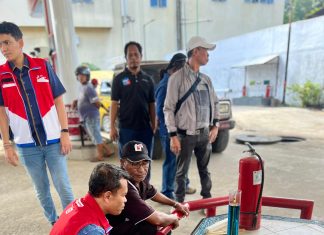Senin 2012-03-12 10:43:15
Papua is one of the biggest province, located in far eastern part of Indonesia, and the north side of Australia. Its large estimated 422,000 square kilometers. The indigenous people of Papua are Melanesian and distinct from the rest of inhabitants of Indonesian archipelago, they organized along distinct tribal lines and speak some 253 different language.
Merauke is an eastern part, district of Papua, acknowledge for its tropical forest by World Wild Fund (WWF). Living in Merauke, four indigenous tribes. They are Malind, Mandobo, Mapi and Auyu, with Malind as the biggest tribe among others in Merauke.
Malind tribe has spiritual bond with their land. They believe that some places in Merauke is sacred place, a place that visited by their ancestor who passed away. More than that, they believe that their ancestor lived on land, so that Malind generation has an obligation to Protect Merauke’s land.
Article 25, Declaration on The Rights of Indigenous People, further explain that indigenous peoples have the right to maintain and strengthen their distinctive spiritual relationship with their traditionally owned or otherwise occupied and used lands, territories, waters and coastal seas and other resources and to uphold their responsibilities to future generation in this regard.
Furthermore, Malind tribe depend on sago, as one of their staple food. Its planted on the land grabbed unconsensually by MIFEE. The phrase land grabbing, refer to the words used by Dr. Olivier De Schutter, special rapporteur on the right to food, he define land grabbing as “land acquisitions and leasesâ€.
Yudhoyono policy “ Feed Indonesia, Feed The Worldâ€, through MIFEE project, is too risky to left Malind tribe live in hunger. MIFEE, in which various corporate involved such as Medco, Rajawali Group, Bin Laden Group, and other Multinational companies from Japan and Korea, prioritizing the allocation of land for industrial timber plantation (over 970.000 ha), oil palm (over 300.000 ha) and food crops (over 69.000 ha). Will the world feed by timber?
Indigenous groups often suffer irreparable harm in the context of development. Therefore the declaration on the right of indigenous people launched in 1980, as convinced in the preamble, that the development has to be in accordance with their aspiration and needs.
The traditional land grabbing processes, in which threatened tribes in Papua, beside annihilate tropical forest which could affect the ecosystem, should be done with respect to the living tribes.
Article 10 of the declaration explain that “No forcible removal from their landsâ€. Relocation needs free, prior and informed consent and fair compensation and where possible an option of returnâ€. The land grabbed for the palm oil plantation, the compensation offered by company is IDR 90.000/hectare, equal to 10 USD/hectare (1 USD = IDR 8608).
Eventhough the compensation rate is not the determining factor for Malind tribe to reject the land grabbing. As seen on documentary video uploaded in You Tube, Malind tribe were concern on their belief of their ancestor which live in Merauke, as it is the sacred place for them. They believe they will suffer Tiq Anim (deadly desease as a curse from their ancestor) if they sell their land.
Beside fair compensation, article 10 of declaration also mention about the importance of Free, Prior, Informed Consent (FPIC), which emphazise further in article 32 (2) UNDRIP. Free, refer to the free from force, intimidation, manipulation, coercion or pressure by government or company. Prior, refer to enough time for approval of specific project to consider all the information given and make a decision. Informed, refer to the relevant information given to make decision, to be agree or to deny.
Consent refer to collective right to deny or to agree for the project to proceed. All of the information has to be given in a language that can easily be understand, and tribesman has the right to access information from other source than government and companies, tribesman also has the right to access expert on law and other technical issues to help in making decision. Indonesia is one of many countries that support for UNDRIP.
However it doesn’t guarantee that Indonesia consistently comply the provision, since practically, government skip FPIC procedure.
Currently, there are, more or less, seven Papuan workers in MIFEE project, as a blue collar worker. Obviously that most of workers will be brought from other places, since mega project must be need large number of workers. Loosing land, doesn’t mean loosing live. Malind tribes which usually plant and harvest sago tree, now they have to be usual to do sea sand mining.
Another potential risk to the environment. The world potentially loss one of tropical forest, and potentially face sea abrasion. Will Indonesia reconsider their choice to ignore the rights of Malind?, for Malind tribes has their rights over their lands, territories and resources?
It depends on how far Malind go to defend and claim their rights and how much the world support and recognize their rights.
*The writer is a student at the Mahidol University, Thailand.


